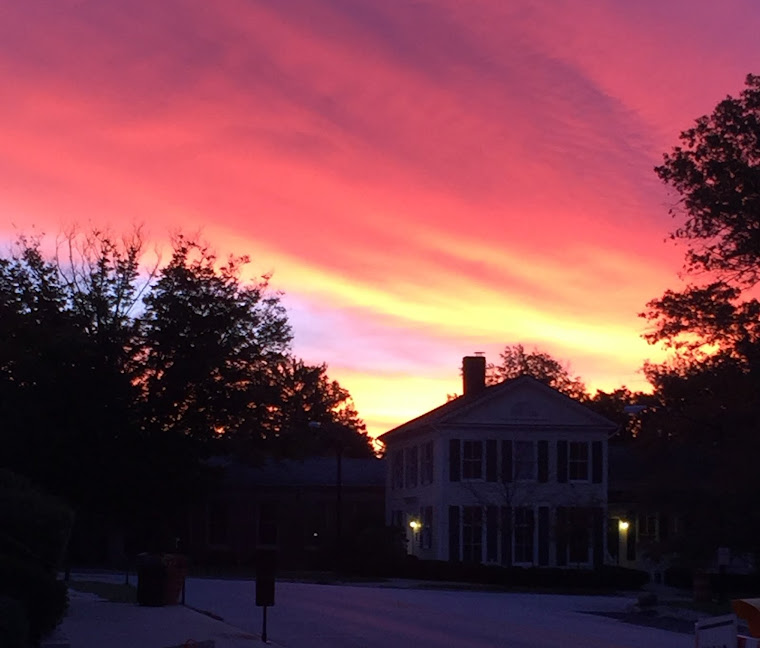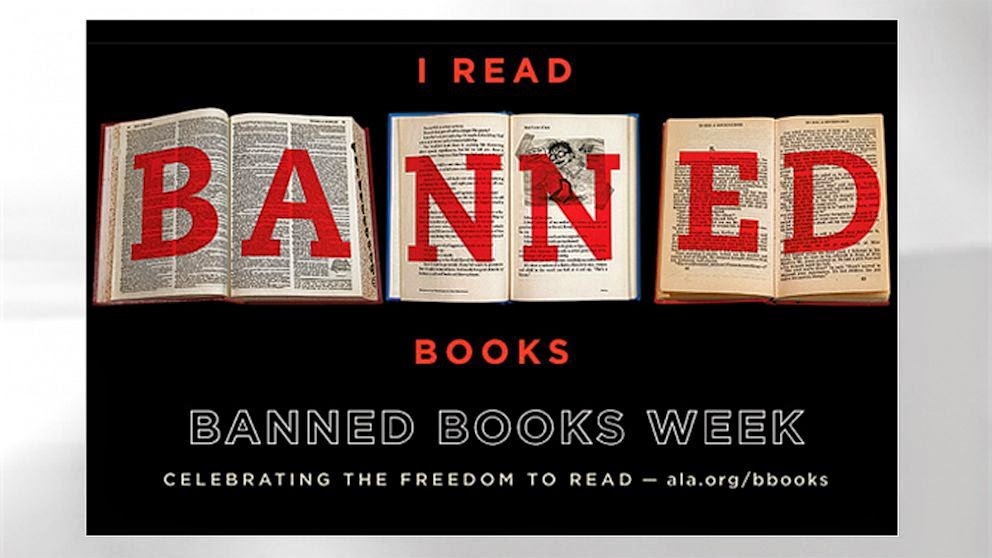 |
Mom & Her Crew:
3 Sons, 2 Grandsons, Granddaughter |
As some of you know my mother, Prudence Osborn Dyer (we share the Osborn name, her maiden name; son Steve (in blue-and-black striped shirt) shares it, as well), had her 95th birthday this week--September 9. Born in 1919 (World War I ended in 1918), she has lived through quite a lot. The Great Depression, World War II, the Korean War (Dad was on active duty for both WW II and Korea), the 1960s assassinations (JFK, MLK, RFK), Watergate, 9/11 ...
Born in Martinsburg, WV (her father was preaching there), she grew up the daughter and brother of ordained ministers (Disciples of Christ). Both her father (G. Edwin Osborn) and brother (Ronald E. Osborn) were prolific scholars and writers, too (you can check them out on Amazon or ABE), and her mother was a gifted, compassionate woman. Her father died in 1965--I was in college; her mother, in 1978--I was teaching at Harmon Middle School and, at the time she died, I was on strike!
Mom was extraordinarily bright and disciplined. While we were living in Enid, Oklahoma (my boyhood years), she took her first teaching job--English at Emerson Junior High School, where she quickly distinguished herself. She also taught the first black students in Enid, who'd previously been confined to separate schools until Brown v. Board of Education, 1954. Enid took awhile to integrate (they paid particular attention to that phrase
all deliberate speed; they especially liked the
deliberate part), but Mom was there when it happened.
We moved to Hiram, Ohio, in the summer of 1956. Hiram had hired my dad to be the Chair of the Division of Education, and Mom began what would be a ten-year teaching career at James A. Garfield High School in nearby Garrettsville. She finished a Master's degree while teaching--and then decided, with Dad's encouragement, to get a Ph.D. She would teach all day--then (on Tuesdays and Thursdays), drive the 100 miles or so to the Univ. of Pittsburgh for night classes, returning late,
late at night to Hiram. She would then rise and head off to teach all day again. In the summer she would rent a little room in Pittsburgh and stay for the summer sessions, returning home for weekends. She was amazing.
In 1966--the year I graduated from Hiram College--both Mom and Dad took positions at Drake University in Des Moines, Iowa, where they joined their best friends, Rose and Paul Sharp. Dr. Paul Sharp, who'd been president at Hiram for a while, was now the new president of Drake. And he knew what Mom and Dad could bring to the faculty.
They had great careers there--Mom, especially, who came into her own. She taught herself Greek (she already knew Latin and French) and soon began taking groups of teachers to Greece each summer for educational tours.
When Mom and Dad both retired just before--and just after--1980, they moved to Cannon Beach, Oregon, where they built a home that Mom designed overlooking the beach. They could see Haystack Rock, the surf, the mountains. They had one of the loveliest views I've ever seen.
 |
Mom and Dad's place was just on the other side
of the finger of land (Tillamook Head)
sticking out from the left in the near background. |
Mom loved Cannon Beach. She had dear friends there, and she was very active, well into her 70s, hiking the local trails, swimming. She was fit and happy.
But then Dad's health began to fail. A series of strokes knocked him down; he rose--with a cane. But he had "lost something"--not just physically but intellectually, as well. Soon, he was reading only the newspaper and watching TV and sleeping.
When it became apparent that Dad could no longer stay in the Cannon Beach house, they built another place in Seaside--a more "senior-friendly" place with very different living areas for the two of them--at opposite ends of the house.
And Dad grew worse. My brothers and I convinced them to move back East where we could help out, but when they chose to live in western Massachusetts (Pittsfield), I knew I wouldn't be seeing them very often--though my two brothers, who lived in Boston, would be able to--and did.
And Dad grew worse. They soon had to leave their little cottage and move to an assisted living facility in Pittsfield. Mom didn't need it, but Dad most certainly did, so they got two units there.
And Dad grew worse. He'd declined from cane to walker to wheelchair (he was
wild in his motorized chair--banging into walls and people at the facility; my brothers and I didn't know whether to be alarmed or amused). And soon he was
down and in a nursing home, where, mercifully, he didn't have to endure much more.
My father died at 11:15 a.m., November 29, 1999. He was 86. Mom was with him. My brothers and I had been back and forth throughout the fall--many times. But only Mom was there at the end--something I profoundly regret.
Meanwhile, as soon as Dad had left assisted living for nursing, Mom got ready to move
out. She was still active and healthy (she turned 80 in 1999). She got her own condo in Lenox and enjoyed a few years of independence there. She was doing so well that we twice took her with us for a week of plays at the Stratford Festival in Canada. My brothers took her all over the place, too.
But soon it became clear she could not live on her own. She had a terrible car accident, breaking her neck (but suffered no paralysis), and, fortunately, she had not hurt anyone else. But she was having quick periods of blackout, and my brothers and I knew we needed to do something. So we helped her move into Kimball Farms, a stages-of-care place where she remains. She was in the independent wing for quite awhile, then a few years ago moved to assisted living, which she really needs now.
Gradually, her abilities have abandoned her. She can no longer use a computer (she was really quite adept with it at one time; now, she can't remember how to turn it on and off). She can't read books anymore (she was a voracious reader), though, the other day, she was reading the newspaper when Joyce and I came by to see her. She flips through magazines. Because she took so many falls when she was using a cane and then a walker, she is now in a wheelchair and is--as she well knows--close to another move--to the nursing wing. She has been there several times already for rehab. And she does
not like it. (Who would?) She still keeps a few books piled beside her on her table in her living area--but they're the same books, in the same order, that have been standing there for a couple of years. She kind of knows, I think, that she
ought to read--but she just can't.
I'd been worried about her the last couple of visits. Her ankles were badly swollen and blue (we all know what
that means), and her energy was fading fast, along with her ability to find the words she wants to use. She can no longer carry or really initiate a conversation; she listens (though her hearing is bad), replies.
But this most recent visit, things were better. Her ankles look
much better; she was more adept in conversation. Joyce and I, for instance, were talking about the "plank" on a pirate ship, and Mom quipped: "There were times when I could have used one." Thinking, no doubt, of the noxious me of teen-agery.
And I told her that I'd been invited to give a little talk at Western Reserve Academy in October (I retired from the faculty in June 2011), but I was not sure, even though I'd accepted, that I was feeling up to it. And she said, "Danny, the time will come when no one will ask you to speak, so you probably should do it." And so I will--mostly (entirely?) for
her.
As my brothers have noticed, one of her enduring traits is her sense of humor. She still loves to laugh--at silly things, at herself. I wrote the other day about her laughter while she was struggling to eat Japanese noodles at her birthday bash. It's quite a trait, her humor. I'm pretty sure that if I were in her position, I'd be screaming obscenities until they sedated me into some profoundly pacific state.
Not Mom. She endures. Nods and naps. Pages through magazines and newspapers. Waits for her sons to write or call or appear. Laughs whenever she can.
Such a wonder is my mother, Prudence Dyer, 95.






























